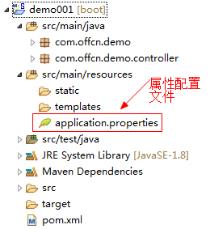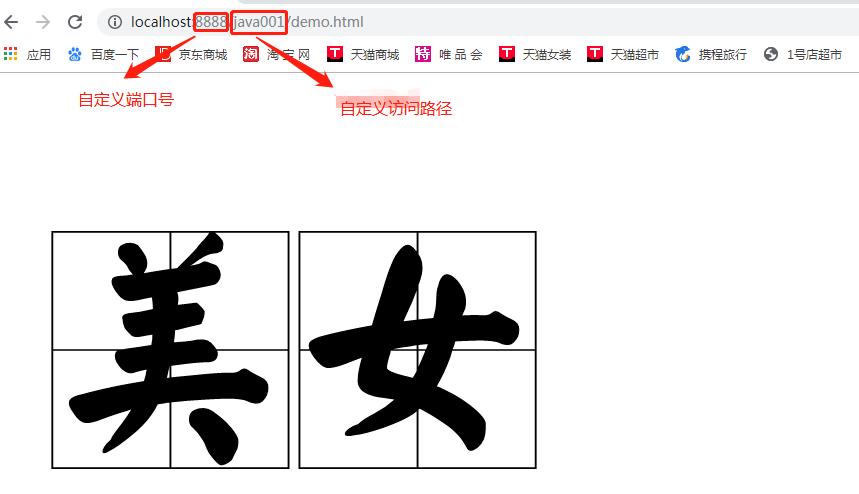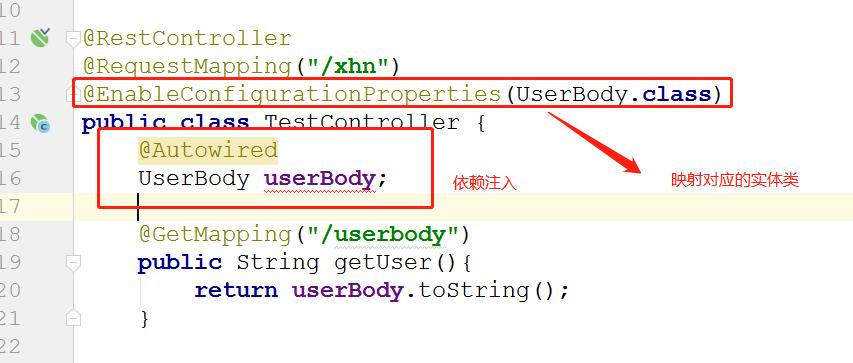springboot第三天---SpringBoot属性配置
Posted 阿楠121397442
tags:
篇首语:本文由小常识网(cha138.com)小编为大家整理,主要介绍了springboot第三天---SpringBoot属性配置相关的知识,希望对你有一定的参考价值。
引言:
Spring Boot并不真正是所谓的『零配置』,他的理念是“习惯优于配置”采用了一些默认的习惯性配置,让你无需手动进行配置,从而让你的项目快速运行起来。所以要想玩转Spring Boot,了解这些默认配置还是必不可少的。
1、项目默认属性配置文件所在位置及配置实例
创建Spring Boot项目时,会默认生成一个全局配置文件application.properties(可以修改后缀为.yml),在src/main/resources目录下或者类路径的/config下。我们可以通过修改该配置文件来对一些默认配置的配置值进行修改。

【修改默认配置】
1、spring boot 开发web应用的时候,默认tomcat的启动端口为8080,访问路径为/
如果需要修改默认的端口和访问路径则,则需要在application.yml添加以下记录:
server: port: 8888 servlet: context-path: /java001
图片演示:

效果演示图:

2、自定义属性及读取
我们可以在application.yml文件中,配置一些常量或者其他参数配置。读取的时候通过Spring的@Value(“${属性名}”)注解即可。
package com.xhn.springbootdemo.controller; import com.xhn.springbootdemo.po.UserBody; import org.springframework.beans.factory.annotation.Autowired; import org.springframework.beans.factory.annotation.Value; import org.springframework.boot.context.properties.EnableConfigurationProperties; import org.springframework.web.bind.annotation.GetMapping; import org.springframework.web.bind.annotation.RequestMapping; import org.springframework.web.bind.annotation.RestController; @RestController @RequestMapping("/xhn") @EnableConfigurationProperties(UserBody.class) public class TestController { @Autowired UserBody userBody; @GetMapping("/userbody") public String getUser(){ return userBody.toString(); } @Value("${xhn_ip}") private String xhn_ip; @Value("${xhn_port}") private String xhn_port; @GetMapping("/getValue") public String getArgs(){ return "xhn_ip:"+xhn_ip+",xhn_port:"+xhn_port; } }
application.yml配置文件中为:
xhn_ip: 10.10.42.28
xhn_port: 6666
对应的实体类为:
package com.xhn.springbootdemo.po; import org.springframework.boot.context.properties.ConfigurationProperties; @ConfigurationProperties(prefix = "userbody") public class UserBody { private long id; private String name; private String mobile; private String address; private Integer age; public long getId() { return id; } public void setId(long id) { this.id = id; } public String getName() { return name; } public void setName(String name) { this.name = name; } public String getMobile() { return mobile; } public void setMobile(String mobile) { this.mobile = mobile; } public String getAddress() { return address; } public void setAddress(String address) { this.address = address; } public Integer getAge() { return age; } public void setAge(Integer age) { this.age = age; } public UserBody(long id, String name, String mobile, String address, Integer age) { this.id = id; this.name = name; this.mobile = mobile; this.address = address; this.age = age; } @Override public String toString() { return "UserBody{" + "id=" + id + ", name=\'" + name + \'\\\'\' + ", mobile=\'" + mobile + \'\\\'\' + ", address=\'" + address + \'\\\'\' + ", age=" + age + \'}\'; } public UserBody() { super(); } }
访问效果图为:


3、实体类属性赋值
当属性参数变多的时候,我们习惯创建一个实体,用实体来统一接收赋值这些属性。
(1)、定义配置文件

内容需要保密,阅读的小伙伴需要自己手动输入自己想设置的内容,谢谢
(2)、创建实体类:在前边UserBody实体中增加注解@ConfigurationProperties,并指定prrfix前缀
即可

(3)自定义实体类controller层代码

效果图展示:

以上是关于springboot第三天---SpringBoot属性配置的主要内容,如果未能解决你的问题,请参考以下文章